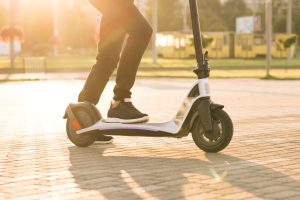On a clear afternoon in central Bishkek, three teenage boys on yellow kickscooters zip past a woman who waits for the light to turn green. The woman scolds the boys for not watching where they are going, but they are already out of earshot, having sped across the street.
This type of interaction has become common in Bishkek, where the e-kickscooter market – also called kicksharing – has taken off in the last two years.
All over the city center and its more residential outskirts, people can scan QR codes to activate brightly painted e-kickscooters through various operators’ apps. Until recently, the dominant operators have been Kyrgyz and Kazakh startups, which hit the ground running in mid-2022 with unique pricing models and coverage throughout Bishkek’s neighborhoods. In May 2024, Russian-owned Yandex entered Bishkek’s e-kickscooter rental market with higher rates than other companies.
Interest and demand have grown quickly. Baktiyar Kodjokeyev, the commercial director of SunRent, told 24.kg in an interview in October 2023 that the company had raised some $3 million from investors to buy 3,000 new scooters and expand to other cities in Kyrgyzstan.
As kicksharing grows more popular, local government actors have taken notice of the practice as a possible solution to Bishkek’s urban development challenges. The expansion of kicksharing could help reduce traffic congestion and lessen the city’s ecological footprint.
Until recently, the kicksharing market was essentially the wild west, with no rules on who can use the scooters or where. A 2023 report by McKinsey found that 29 of 100 global cities – including New Delhi, Dhaka, and Cairo – had no regulations in place. In Kyrgyzstan, this lack of regulation fostered unsafe conditions. In 2023, traffic safety authorities registered 81 accidents involving electric scooters across the country. Given that there are about 7,000 traffic accidents annually in Kyrgyzstan, this number represents a very small fraction of overall collisions, however.
Jogorku Kenesh, Kyrgyzstan’s parliament, first proposed legislation in September 2023 – shortly after Kazakhstan adopted regulations – and President Sadyr Japarov signed a bill into law in April 2024. The law adds e-kickscooters to the list of vehicles eligible for 1,000 som ($11) fines for traffic violations and limits the use of e-kickscooters to those older than 14. If a person is found to be intoxicated while operating an e-kickscooter, they face a 3,000 som ($34) fine.
The law also bans people from riding e-kickscooters on sidewalks. This aspect of the law is in tension with the reality of urban infrastructure in Bishkek. While Bishkek has expanded bike lanes in recent years, largely thanks to civic activism, the infrastructure for biking and scootering remains underdeveloped. A few major streets have designated bike lanes, but they are often blocked by parked cars, and it can be dangerous for riders to try and maneuver through traffic on Bishkek’s busy streets.
Most bike lanes are not on the street, but rather on the sidewalk. There is no barrier, and only a painted line divides bikers and scooterists from pedestrians. Many pedestrians are unaware of what the painted line represents and wander over into bikes’ and scooters’ paths.
A September 2023 report by the Center for Political and Legal Research, a Bishkek-based think tank, acknowledged the ecological benefits of a growing kicksharing market but emphasized the safety issues that come with more e-kickscooters on the road. Per the report, e-kickscooters are “inconvenient” for pretty much everyone except the driver, because “on the sidewalk it interferes with pedestrians, and on the roadway it interferes with vehicles.” Until Bishkek further develops its infrastructure for alternative forms of transportation, this dynamic of mutual inconvenience will continue to rile.
Given how recently fines for e-kickscooters were introduced, local media have not yet reported on the number of violations in Bishkek. In Almaty, which passed a similar law in late August 2023, officials handed out 1,385 fines to e-kickscooter users in the month of September 2023 alone. Almaty’s population is nearly double that of Bishkek, though, and their kicksharing market is much larger. Nevertheless, Bishkek’s neighbor to the north shows the scale of poor behavior on e-kickscooters.
These new regulations stand to change the way that people use e-kickscooters, hopefully for the better, but there is also room for officials to shape how kicksharing operators work as well.
Jogorku Kenesh deputy Ulugbek Ormonov told Kaktus that the companies should pay money to the city to rent parking space for the scooters. Parking for one scooter costs 1,500 som a month ($17). Ormonov said that three companies paid 925,500 som over the course of nine months – accounting for only 68 scooters, far below the 860 scooters these companies report renting out.
The market is bigger than three companies, though, and even back in 2022 local media reported that there were some 1,200 e-kickscooters available for rent in the capital. As a conservative estimate, Bishkek could be making more than a million som ($11,300) a month on the e-kickscooter rental market through parking fees alone.
It’s unclear whether the popularity of the kicksharing market will actually be a boon for Bishkek’s ecological and urban development challenges. Given that shared e-kickscooter use went from nothing to 350 million trips worldwide between 2017 and 2022, though, Kyrgyz authorities are taking a measured approach to ride the wave of popularity.

































